

First-Generation College Students: A Sketch of Their Research Process. Authentic Assessment Toolbox Home Page. To the Authentic Assessment Toolbox, a how-to text on creating authentic tasks, rubrics, and standards for measuring and improving student learning.
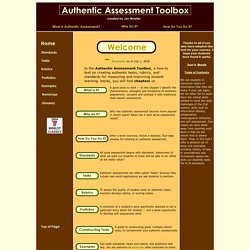
Inside, you will find chapters on A good place to start -- In this chapter I identify the characteristics, strengths and limitations of authentic assessment; compare and contrast it with traditional (test-based) assessment. Why has authentic assessment become more popular in recent years? Pedagogych3. Kennesaw.view.usg. Navigation Welcome to KSU D2L Brightspace This portal provides access to the KSU D2L Brightspace Learning Management System.
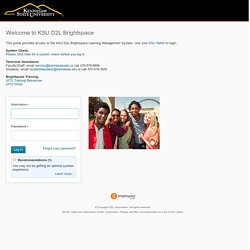
Use your KSU NetID to login. System Check: Please click here for a system check before you log in. Beyond One-Size-Fits-All College Dreams: Alternative Pathways to Desirable Careers, American Educator, 2010. The vast majority of high school students plan to attend college--and believe that a bachelor's degree all but guarantees them a high-paying job.

What many of them don't know is that those who are not well prepared are not likely to graduate. They also don't realize that plenty of career-focused certificates and associate's degrees lead to satisfying careers that pay just as well as, and sometimes better than, careers that require a bachelor's degree. If detailed information on the broad array of higher education and career options were made available to them, students would have more incentive to work hard in high school and a better chance of achieving their dreams. American Federation of Teachers. 555 New Jersey Avenue NW, Washington, DC 20001. Authentic Happiness. Ewell Report. 10. 100 College Students… Represented Visually… And They’re Not What You Might Expect. Use Texting In The Classroom To Assess Student Learning.
Assessment: Mapping Classroom Activities to Assessment Tools. Discussion Guide HowChildrenSucceed. StudentPerspectivesResearchBriefJan2013. Reading Your Textbooks Effectively and Efficiently. More details Skip to main content Dartmouth College Academic Skills Center Quick Links.
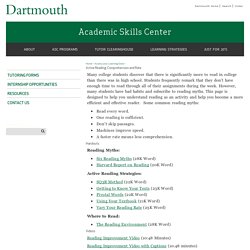
CURRENTSV6N2FooteandMixsonBrookshireP35. 16.1dempsey. HIP_tables.pdf. 100 Search Engines For Academic Research. Back in 2010, we shared with you 100 awesome search engines and research resources in our post: 100 Time-Saving Search Engines for Serious Scholars.
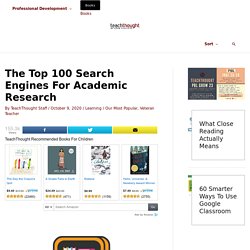
It’s been an incredible resource, but now, it’s time for an update. Some services have moved on, others have been created, and we’ve found some new discoveries, too. Many of our original 100 are still going strong, but we’ve updated where necessary and added some of our new favorites, too. Check out our new, up-to-date collection to discover the very best search engine for finding the academic results you’re looking for.
General Need to get started with a more broad search? Qualities of Academic Writing. Write to Learn At Empire State College — because you study independently, sometimes at a distance from your mentor or tutor — writing is a way to show your mentor you have learned.

But there's a more important reason to write. Writing helps you think, and thinking is what college is all about. About - FYS Research Lab. The Nature of Research - Chapter 4: The Research Process - Online Guide to Writing and Research - Effective Writing Center (EWC) - UMUC. Saved Items - Using the Gale Opposing Viewpoints in Context Database - Hunt Memorial Library at Fort Valley State University. Critical Thinking Resources - East Georgia State College: University System of Georgia. Business Hours: Monday-Friday, 8:00 a.m.-5:00 p.m.Student Affairs: (478) 289-2169Student Affairs Fax: (478) 289-2353Public Safety: (478) 289-2090 Hearing Impaired callers may access our campus phone numbers by utilizing your state relay service (such as the Georgia Relay Service) or by utilizing Video Remote Services.
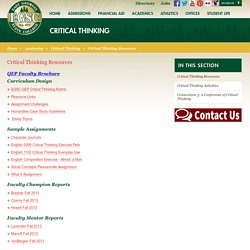
East Georgia State College - Statesboro: 10449 US Highway 301 South, Statesboro, GA 30458 East Georgia State College: Augusta: Physical Address: GRU Summerville Campus, 2500 Walton Way, Augusta, GA 30904 Mailing Address: Payne Hall, 1120 15th St., Augusta, GA 30912. Assignment Calculator. Online Library Learning Center. Publications - Threshold Concepts and Information Literacy. Digital research toolkit 1. Last week I finished the University of Warwick’s Digital Tools for Researchers e-learning course.
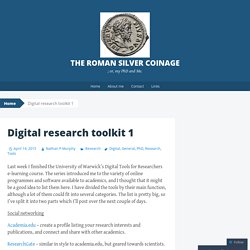
The series introduced me to the variety of online programmes and software available to academics, and I thought that it might be a good idea to list them here. I have divided the tools by their main function, although a lot of them could fit into several categories. The list is pretty big, so I’ve split it into two parts which I’ll post over the next couple of days. Social networking Academia.edu – create a profile listing your research interests and publications, and connect and share with other academics. ResearchGate – similar in style to academia.edu, but geared towards scientists. LinkedIn – mainly used by professionals, this social network can be useful for finding work both within and outside academia. Twitter – ‘microblogging’ site with an ever-expanding academic userbase. ResearcherID – similar to ORCID, but linked to the Web of Science database (see below).
Blogging Collaborative working. Maslow's Human Needs : TED Radio Hour. 21st Century Fluencies Assessment Download. Digital research toolkit 2. As promised, here is part 2 of my round up of content I discovered as part of the Digital Tools for Researchers course at the University of Warwick (part 1 can be found here): Open Access repositories These websites collect and archive Open Access publications and can be searched by web users.
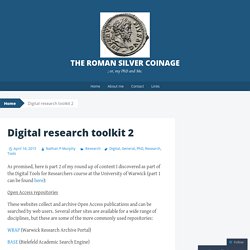
Several other sites are available for a wide range of disciplines, but these are some of the more commonly used repositories: WRAP (Warwick Research Archive Portal) BASE (Bielefeld Academic Search Engine) Information literacy proficiency: Assessing the gap in high school students' readiness for undergraduate academic work. A Rutherford Library, University of Alberta, Edmonton, AB, Canada T6G 2J8b School of Information Studies & Research Institute for Professional Practice, Learning and Education, Charles Sturt University, Boorooma St., Locked Bag 588, Wagga Wagga, NSW 2678, Australiac School of Library and Information Studies, University of Alabama, 513 Gorgas Library, P.O.

Box 870252, Tuscaloosa, AL 35487-0252, USAd Concordia University College of Alberta, 7128 Ada Boulevard, Edmonton, AB, Canada T5B 4E4 Available online 8 February 2013 Choose an option to locate/access this article: Check if you have access through your login credentials or your institution. Model.pdf.
Click link below to enlarge the image. This work is licensed under a Creative Commons Attribution-NonCommercial-NoDerivs 3.0 Unported License. Microsoft Word - Serendipity.docx - Serendipity.pdf. Essential Learning Outcomes - EssentialOutcomes_Chart.pdf. Innovative Libraries, Contact me by email andywalsh or on Twitter @andywalsh999. Exploring information landscapes and bubbles By Andy Burkhardt and Alan Carbery Abstract At Champlain College Library, our information literacy programme is not just about teaching students how to search library databases, or find scholarly articles; it’s about engaging students in critical conversations about their information choices as information consumers. This chapter will narrate how we engage first year students in these conversations using multiple methods, tools, and learning objects. Through the use of mobile phone polling and a TED Talk about filter bubbles, we facilitate student discovery of a wider information landscape.
Inquiry and Analysis Rubric. Inquiry and Analysis VALUE Rubric The VALUE rubrics were developed by teams of faculty experts representing colleges and universities across the United States through a process that examined many existing campus rubrics and related documents for each learning outcome and incorporated additional feedback from faculty. Workplace-IL-annotated-bibliography. Innovative Libraries, Contact me by email andywalsh@innovativelibraries.org.uk or on Twitter @andywalsh999. The Library 1. Finding. Flora realises she is lost not when the canopy begins to obscure the sunlight, but when the roots of the buildings begin to seemingly purposefully trip and obstruct her path. Innovative Libraries, Contact me by email andywalsh or on Twitter @andywalsh999. Reviewing literature is surely a key skill for any budding academic, but particularly for students engaged in postgraduate study.
For about four years I have been teaching a research methods course for a number of Masters level humanities students, which gets assessed through a report on a research project of the students’ choice which includes a brief literature review. Over the last two years in particular I have been getting an increasingly large number of annotated bibliographies instead of literature reviews (often referred to as ‘literary reviews’). The teaching strategies and materials didn’t change over that time period, but clearly students didn’t quite understand the point of using this part of their report to discuss the themes and issues raised in the secondary sources they use. Instead this section often reads like the university equivalent of a finger painting put up on a fridge, saying “Didn’t I do well? Innovative Libraries, Contact me by email andywalsh@innovativelibraries.org.uk or on Twitter @andywalsh999.
Journeying without a map. Microsoft Word - Final Information Literacy VALUE Rubric Revised July 2013 - FinalInformationLiteracyVALUERubricRevisedJuly2013_000.pdf. Answering questions about library impact on student learning. Image by wordshore on Flickr This essay reports on a project which evaluated the Understanding Library Impacts (ULI) protocol, a suite of instruments for detecting and communicating library impact on student learning.
The project was a dissertation study conducted with undergraduates enrolled in upper-level and capstone history classes at six U.S. colleges and universities in 2011. Answering questions about library impact on student learning.